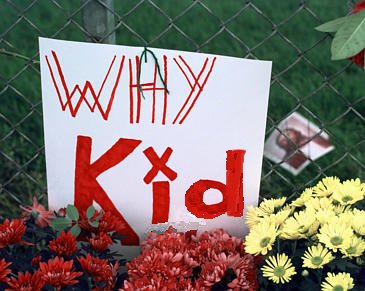
|
At his 16 June 1998 arraignment, Kip Kinkel faced a 58-count felony indictment: four counts of aggravated murder, 26 counts of attempted aggravated murder, six counts of first-degree assault with a firearm, 18 counts of second-degree assault with a firearm, manufacturing and possession of a destructive device, possession of a short-barreled shotgun, and theft.
The charges were laid in the wake of the tragic events of May 20 and 21 when the boy's parents were shot in their home and students were shot and killed at Thurston High School in Springfield, Oregon.
The courts will determine the guilt or innocence of the accused, according to the usual process.
However, there is more raised by this issue and these circumstances than a court case. The courts and the police apply laws, but it is we the people who write those laws. We set the limits of what is right and wrong, through our legislators and in other ways, by exercising our democratic rights and responsibilities as citizens.
Most citizens are not professionals in the fields of law, ethics, mental health, child psychology, or education. Fewer still would claim cross-expertise in all of these fields. Yet, it is largely citizens and other non-professionals who draw the lines and make the rules. It is therefore critical that citizens give these matters careful thought if we are to do our part in ensuring legislators strike the right balance between competing interests, such as freedom and public safety.
We deal with the troubling problems of child violence more often than we'd like, roused by events that galvanize heart-wrenching interest. Often as we discuss ways of doing things differently, we drift away from the concrete into the realm of the abstract, where our prejudices and preconceptions about people and behavior take over. It is important to keep the faces before ourselves as we make decisions that will have profound implications for real human beings.
It is not our aim to take a matter rightly belonging in the courts and to corrupt it. It is rather our aim to use the events that have refreshened concern as a springboard to get the discussion going about how best to address the challenges at the root of such circumstances.
|
What would it take to push a boy over the edge?
In this womb of darkness, we see patchy visions and hear faint sounds of things we've heard described in the news. We see these things and we think we know. But we don't know. The darkness has swallowed the circumstances and replaced them with unease.
Darker still are the vistas of human will and fascination. Events happen and are sometimes seen by many; but who can see with clarity into the human mind?
And somewhere in all the confusion, the need rises within us like an anger and a rage and a fury and a madness and pushes away at all the carnage and fights for air and when it gasps it screams in a thunderous voice: Why?
|
| SOCIAL - DEVELOPMENTAL STORIES |
| What might be the influences on behavior of guns, the Internet, music, and television? What might be the roles of anger, angst, critical period failure, existential choice, hypermasculinization, identity crises, immaturity, malicious peers, military culture, revenge, self-loathing, suicide pathos, and unrequited love? |
| MENTAL HEALTH STORIES |
| What might be the influences on behavior of critical levels of stress, depression (including bipolar disorder: manic-depression), drugs, hormones, insanity, limbic system action, multiple personality disorder or dissociative identity disorder, schizophrenia, sociopathy, and brain tumor? |
| FAMILY STORIES |
| What might be the influences on behavior of abuse, mal-discipline, over-control, and trauma? |
| SPIRITUAL STORIES |
| What might be the influences on behavior of cultism, demon possession, epiphany, and sin? |
| SAD STORIES |
| What about a sad accident that has spun madly out of control? |
 Why do people do the things they do? For centuries, sages and prophets and poets have woven stories that create a tension, and it is from this tension that visions of truth emerge. Let us weave some fictions and foster a dialectic, to see if from the conflicts we create we can't learn a thing or two that may help us in our efforts to understand and deal with human behavior in the social context.
Why do people do the things they do? For centuries, sages and prophets and poets have woven stories that create a tension, and it is from this tension that visions of truth emerge. Let us weave some fictions and foster a dialectic, to see if from the conflicts we create we can't learn a thing or two that may help us in our efforts to understand and deal with human behavior in the social context.